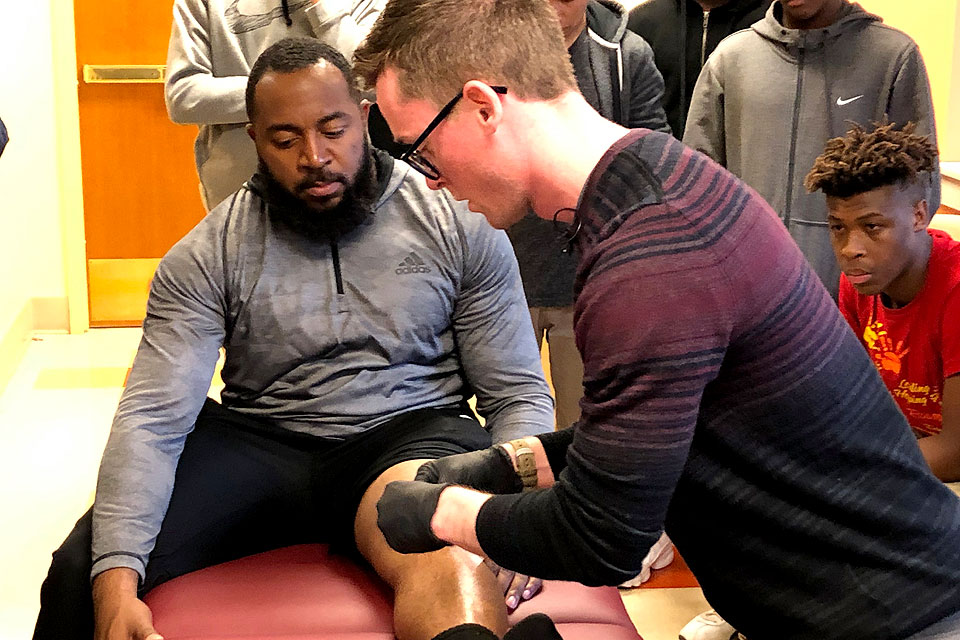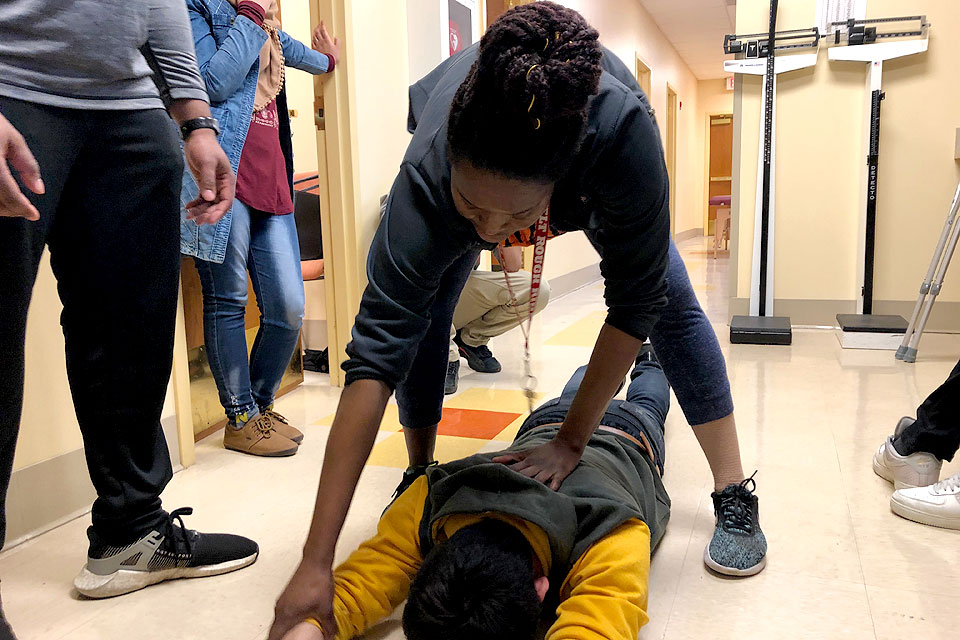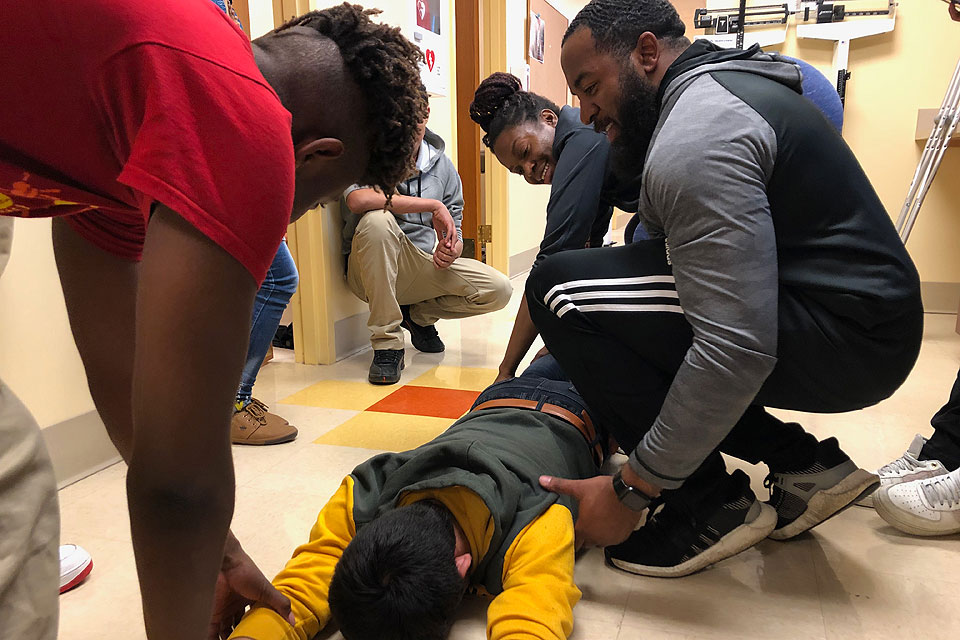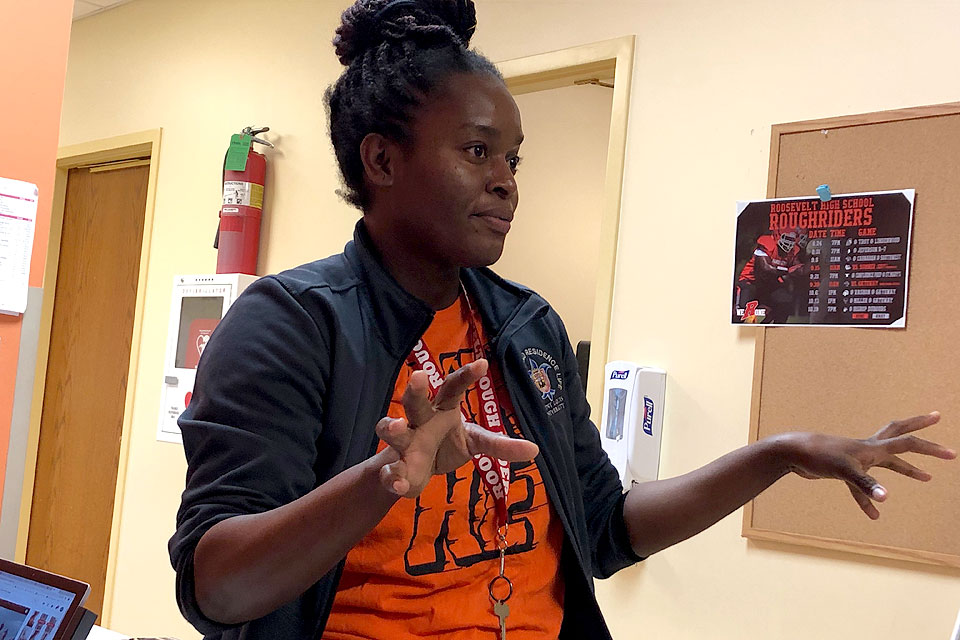Doctoral Student Introduces High School Students to Health Care System Through Athletic Training
As Roosevelt High School’s “Coach K,” Saint Louis University graduate student Kemba Noel-London helps high school athletes play sports safely while they learn about the health care system through sports medicine.
A 2012 alumna of the Master of Athletic Training Program, Noel-London also earned her bachelor of science degree in exercise science from SLU. She's returned to bring the skills and expertise she learned in SLU's classrooms to a new generation of students.
A doctoral student in SLU’s College for Public Health and Social Justice, Noel-London is working with students from Roosevelt and another St. Louis Public Schools’ high school as not only an athletic trainer for Roosevelt’s sports teams, but also as a public health resource and mentor with the school’s Athletic Training Club (AT Club). Her graduate assistantship is funded through the Doisy College of Health Sciences.
The club, sponsored by SLU’s Athletic Training Program in Doisy College of Health Sciences, received the first Ethnic Diversity Enhancement Grant from the National Athletic Trainers’ Association’s Ethnic Diversity Advisory Committee in 2015 and another award from the program in 2017.
To date, more than 100 students from the St. Louis Public Schools, and 25 SLU students, including Noel-London, have taken part in the club’s work to introduce health and athletic training professions to students in a diverse urban setting.
“I’m a very solution-oriented person,” Noel-London said. “For me, that meant going into public health because I recognized that the problems I saw in the sports medicine world were just a smaller representation of what was happening in the wider health care system. And we’re getting them into the health care system through sports medicine.”
Experiencing the Need for Sports Medicine First Hand
As a teenager growing up in Trinidad and Tobago, Noel-London was an accomplished athlete. While training with her country’s senior women’s volleyball team, however, she came close to seeing her sports dreams fall apart through lack of access to trained sports medicine providers.
While practicing, she went up to spike a ball. Hearing a pop, Noel-London went down with a knee injury. The team had no athletic trainer on standby, she recalled, and her coach had to drive her more than an hour to reach a relative to care for her.
A day later, Noel-London’s knee had swelled to the size of a grapefruit. After being taken to a hospital, she was diagnosed with a torn ACL.
Although she recovered and toured with Trinidad and Tobago’s national junior team six months later, her injury and recovery set her path into sports medicine.
Coming to SLU in 2003, Noel-London earned her bachelor’s and master’s degrees in athletic training. She then interned at the University of South Carolina before working as an athletic trainer internationally for several years.
She worked with Trinidad and Tobago’s national men’s rugby team, with sports teams from Australia and Canada and with athletes from around the world. Noel-London said the experience with global health care systems drew her to the field of public health. She returned to SLU in 2016 to study public health and access to health care at the doctoral level.
Partnering to Improve High School Students’ Access to Sports Medicine
SLU’s Athletic Training Program has been working with St. Louis area high schools for years to expose students to health and athletic training professions, and to expand students’ access to athletic training services.

In 2013, the program, the University and SLU’s academic medical practice, SLUCare, began work with two Archdiocesan high schools, St. Mary’s High School and Bishop DuBourg High School, to introduce full-time athletic trainers to the schools’ sports programs. The program, which has been incorporated into services provided by SSM Health, has expanded to Cardinal Ritter College Preparatory High School and Rosati-Kain High School.
The program began working at Roosevelt High School in 2015.
“The SLU Athletic Training Program is committed to the University mission of service to our community and to the promotion of our profession,” Anthony Breitbach, Ph.D., associate professor and director of the Athletic Training Program, said. “Over the past five years, we have been on-site providing care, mentorship and opportunity for students in our community. This program has also been important for developing our SLU students’ leadership capabilities and cultural competencies.”
Lighting the Fires of Change for Good
After returning to SLU and beginning work with Roosevelt’s AT Club, SLU volunteers recognized that their new students needed services beyond traditional athletic training. Incorporating athletic training into Roosevelt's existing school-based health center helped “light some fires,” to foster a new school culture where students could feel comfortable accessing health care on-site.
In a school-based health center care model, schools serve as health care access points where students can get care, from sports medicine treatments to basic screenings, as a way of enhancing their overall health and education.
“The whole premise of a school-based health center is to keep kids healthy so that they don’t miss school because education is one of the most consistent indicators for health outcomes,” Noel-London said. "Tony (Breitbach) recognized that athletic trainers were a natural fit in this model, and after including me on the ground at Roosevelt, it helped change the perception of the clinic and made athletes and students more comfortable about potentially coming to the clinic for care."
Making students feel comfortable seeking care, and changing kids’ minds about an athletic trainer’s role in their care, has been critical to Noel-London and the program’s work.
“I want them to really and truly recognize that I’m here to help keep them playing, and not to keep them from practice,” Noel-London explained.
Introducing Career and Health Care Models to Students
A key piece of the AT Club’s work, Breitbach and Noel-London said, is to introduce kids to new career paths in the health sciences and in sports medicine.
The club has brought its members to special outreach days with Billiken Athletics. Roosevelt’s students meet with SLU student-athletes, coaches and athletic trainers. They have explored SLU’s athletic facilities and attended games, getting to see SLU’s sports medicine staff in action.
“You need to have some kind of intervention to introduce them to people who look like them, who work in sports while making a bigger impact on the health of the community,” Noel-London said.
Part of the club’s work is to inspire kids to take control of both their health and their futures.
“I’m going to give them skills that become real-world practical skills, and I try to make that connection between ‘you have the ability to help people around you,’ right?” Noel-London said. “You now have to be interested and engaged in wanting to do it.”
One student has even told Noel-London that he is coming for her job.
“I never thought I’d feel so great to have someone tell me that they are going to take my job,” Noel-London recalled. “By all means, it’s here for you, and I will help you.”
Founded in 1818, Saint Louis University is one of the nation’s oldest and most prestigious Catholic institutions. Rooted in Jesuit values and its pioneering history as the first university west of the Mississippi River, SLU offers nearly 13,000 students a rigorous, transformative education of the whole person. At the core of the University’s diverse community of scholars is SLU’s service-focused mission, which challenges and prepares students to make the world a better, more just place.
Video by Stephanie Mueller, University Marketing and Communications.
Story and photos by Amelia Flood, University Marketing and Communications.




















